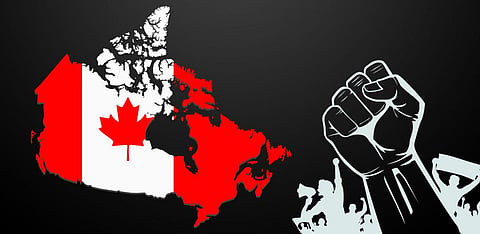

Protestors gathered in the Canadian capital of Ottawa last week and marched to the Prime Minister's office to symbolically deliver a letter raising concerns about "escalating human rights abuses in India" and proliferation of RSS-linked groups in Canada.
—
ON August 20, over a hundred protesters gathered in Ottawa, the capital city of Canada, for a demonstration to highlight "human rights violations in India" and the "rise of Hindu supremacist ideologies in Canada".
The protestors took out a rally from the monument dedicated to universal human rights in Ottawa to Parliament Hill and then to the Prime Minister's office to symbolically deliver a letter signed by members of the civil society and faith-related organisations.
The letter urges the Canadian government to issue a public condemnation of the "systematic discrimination, genocide incitement, harassment and violence faced by religious and other minorities in India, including Muslims, Christians, Dalits, Adivasis and Sikhs, as well as Kashmiris."
The letter also urges Canadian trade and investment agreements with India to be contingent upon India's respect for human rights and protection of vulnerable communities.
Seventy-six years after independence, India is increasingly becoming "a fascist state under the Hindu ultra-nationalist government headed by Prime Minister Narendra Modi," a statement released by the organisers of the protest march says.
The statement says that the protest march was undertaken to make the voice of their protestors heard in defence of democracy and support for "a pluralistic, multifaith and multiethnic vision of India".
Taha Ghayyur, executive director of Justice for All, Canada, said the rally should be seen as a "resolute stand for the rights and dignity of minority communities, both in India and Canada."
"Today, we have united under [under the banner of] shared human rights values and declare that we will not be silent spectators to fascist forces that seek to divide and oppress the most vulnerable," Ghayyar averred.
International human rights lawyer Shivangi Misra said that India's public institutions have been "systematically eroded to serve the interests of Hindutva ideology and the far-right."
Misra stated that there is a "severe lack of accountability and access to justice for the ongoing extreme violence against minorities, the state-led destruction of their homes, dilution of workers' rights, and for silencing human rights defenders with false cases."
Concern has been raised about the actions of the Bharatiya Janata Party (BJP) which currently heads the Union government in India.
"Of great concern is the BJP's intensified restrictions and efforts to silence civil society activists, journalists and human rights defenders who expose and criticise government abuses across India and Indian-administered Kashmir, resulting in an environment of fear and repression," the letter to the Canadian PM says.
In his remarks at the protest, Bruce Katz, co-president of Palestinian and Jewish Unity sought to draw parallels between the struggles of Kashmiris and Palestinians.
Katz said that India and Israel "use the alibi of security as justification for their respective illegal occupation. The parallels between the occupation of Kashmir and the occupation of Palestine are glaringly obvious."
The statement further charges the BJP of continuously abusing India's foreign funding regulations and imposing allegations of financial irregularities "to harass rights groups and political opponents undermines the vital work of Indian civil society and its Constitution."
In the letter to the Canadian Prime Minister (PM), it is claimed that there has been a growth of Hindutva and Hindu supremacist groups in Canada which are actively spreading in schools and various other institutions as well as on digital platforms.
"This presence of far-right groups in Canada promotes an exclusionary and discriminatory ideology that undermines Canada's principles of inclusivity and diversity," the letter says.
The letter says that the "exclusionary" ideology of Hindutva treats non-Hindus, particularly Muslims, as people "who must be monitored, deprived of rights and even expelled or eliminated".
The letter mentions a report titled Rashtriya Swayamsevak Sangh Network in Canada by the National Council of Canadian Muslims (NCCM) and the World Sikh Organisation documenting the reach of the Hindu nationalist organisation in Canada.
The signatories contend that RSS' ideology fuels a climate of hostility and animosity, leading to violence and widespread denigration of Muslims.
"Caste supremacy is overtly present in Canadian public life and Dalit and other marginalised communities, especially children, experience caste-based violence and discrimination in schools and playgrounds," said Chinnaiah Jangam, associate professor of history at Carleton University and co-founder of the South Asian Dalit Adivasi Network (SADAN).
"Hindu right-wing organisations are posing a serious threat to the multicultural society of Canada," he said further.
The letter asks the Canadian government to specifically investigate and monitor the organisations Sewa Canada and Hindu Swayamsevak Sangh, groups which enjoy charitable tax status.
It has been suggested to the Canadian government to ban groups affiliated to the RSS using the country's hate speech laws "due to the safety issues they (the RSS) pose" for Canadian Muslims and Indian-origin Canadians.
"Allowing these groups to operate in Canada not only endangers the safety of Canadian Muslims but also contradicts the fundamental values of equality and respect for all individuals, regardless of their religious background," the letter reads.
The Canadian government has been urged to take a firm stance against "such discriminatory and divisive ideologies" to ensure the safety and well-being of the country's citizens.
It has also been urged to investigate potential influence by RSS-affiliated entities within the Canadian democratic processes.
"As individuals and organisations dedicated to upholding Canada's international legal obligations and human rights globally, we urge the Prime Minister's office to address the pressing issues outlined and take diplomatic measures," the letter to the Canadian PM says.